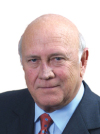
It is a mark of how far South Africa has advanced from the apartheid years that the anticipated death of the 90-year-old former president Nelson Mandela, suffering from general ill health, is not a cause of concern.
“I think it will be a moment of reconciliation in South Africa when Mandela dies. He has gained the respect of all South Africans who will mourn the death of a great South African,” says 63-year-old FW de Klerk, the Afrikaner former president who won the Nobel Peace Prize along with Mr Mandela in 1993 for the creation of a non-racially based state.
Advertisement
However, Frederik Willem de Klerk, popularly known as FW, is troubled about the probable election of Jacob Zuma as president in April 2009 without the candidate having been cleared of pending corruption charges. “All South Africans are deeply concerned and feel it would be to the detriment of South Africa to have a president who has not been cleared of these charges in proper court proceedings,” he says. He feels Mr Zuma’s lawyers need to stop their delaying tactics. They are currently appealing the latest ruling from the Supreme Court of Appeal, which has reinstated 18 charges against the African National Congress (ANC) leader in connection with a $5bn arms deal in the late 1990s.
Policy-based divisions
Still, Mr de Klerk, interviewed by fDi on a visit to London, is positive about the overall political and economic direction of his country. The birth of a breakaway ANC party, the Congress of the People (COPE), represents a maturing of the “historically racially based divisions to policy-based divisions”, he says. He expects that in the coming years there will be further splits from the ANC and more coalition governments at municipal and provincial level, marking the end of the party’s 15 years of overwhelming dominance of the political stage.
Meanwhile, he says, the ANC’s manifesto for the forthcoming election shows a clear swing to the left – but not in a radical way. He notes that late in 2008, a new expropriation law that would have undermined private property rights was withdrawn after a public outcry, led by his Center for Constitutional Rights. Mr de Klerk expects it to be tabled this year in an amended, moderate form.
He also believes the ANC under Mr Zuma is willing to adjust policies that have led to an exodus of about 20% of the country’s white population, a large percentage of whom are highly skilled. “They are realising the emphasis needs to be changed from unbalanced affirmative action and over-zealous black economic empowerment to ensure efficient delivery [of services],” he asserts. Mr de Klerk, who is chairman of GLF, a foundation to promote global good governance, points to an internal debate in the ANC on actions such as suspending affirmative action in certain skilled professions that have a high level of vacancies.
Assurances on economy
The legacy of Thabo Mbeki, deposed as president in 2008, includes a relatively healthy economy that has seen sustained growth since 1994. “Zuma has given wide-ranging assurances that there will be no wide divergence from Mr Mbeki’s economic and financial policies,” notes Mr de Klerk – although he posts the caveat that critics of the ANC leader say he adjusts his message for his audience.
Although the economy is set to be negatively affected by the global slowdown, with forecasts of GDP growth slumping to 1.5% on the back of lower commodity and auto demand, plus a drop in tourism, there are a number of positives. These include a healthy banking system, a programme to upgrade the country’s infrastructure and the hosting of the football’s World Cup in 2010 – a showcase for the new South Africa and a morale booster for its population. “I think the government is getting the basics right,” says Mr de Klerk.
Advertisement
CURRICULUM VITAE
FW DE KLERK
2000FW de Klerk Foundation
Founder
1996-97Government of South Africa
Leader of the official opposition
1993Nobel Peace Prize
Co-recipient
1989Government of South Africa
State President
1972Parliament of South Africa
MP for Vereeniging